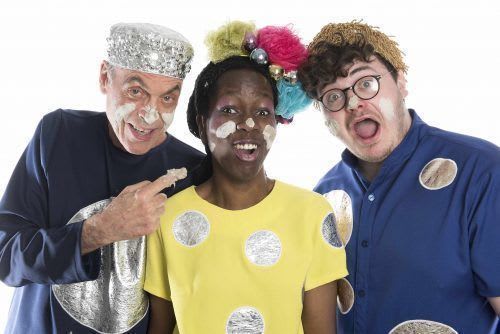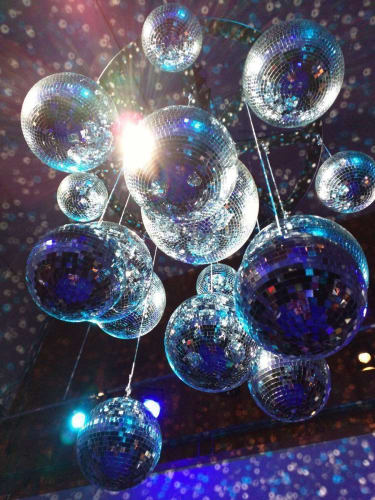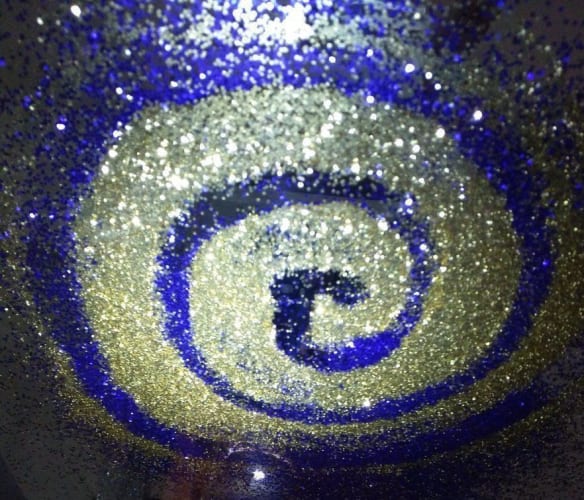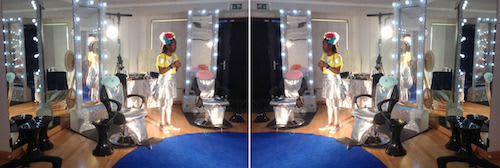The latest show from this very special company which designs its productions for audiences with profound and multiple learning disabilities (PMLD) or autism spectrum condition (ASC) takes its theme from a beauty salon, a rather unusual environment for an audience largely of youngsters, but it provides a sparkling setting for their particular brand of immersive theatre.
This isn’t a play with a narrative in the usual way but a sequence of experience providing sensory stimulation to give pleasure and awaken responses. It has a very small audience of just six, with their carers (though a small group of observers can attend some performances). Numbers are limited to maintain the atmosphere and enable the cast to give every child their attention.
As the audience gather, they can get a foretaste of what is coming in a play space where a circular carpet covered with colourful cushions has hand mirrors, make-up brushes and bright pop-poms for them to handle. There’s a stage manager nearby with a pom pom on her headband and a shiny quilted apron marked with a mirror-like roundel.
I saw a performance with a mixed group in wheelchairs, only a couple sufficiently mobile to take part in pre-show play. Each child has different needs and Oily Cart actors have to be extremely observant and respond to them accordingly. Sometimes, when presenting the show to a special needs school audience for instance, they may have prior information about each individual but they are often without it and must make their own constant assessment.
The stage manager leads everyone through to the performance space where they discover a circular environment of six high, rectangular mirrors edged with bright lights with comfortable make-up chairs set up in front of them. A cluster of glitter balls sparkles high up above them and there are shiny things everywhere. Perhaps it is more like a film star dressing room than a salon.
One mirror doesn’t have a chair. Instead, there is harpist Micol Degli'Innocenti playing lovely rippling music. With a wave, the three actors say hello and introduce themselves: Griff Fender (an Oily Cart old-hand who brings years of experience of working with their audience) in a blue outfit with a silver moon on it and a silver hat; he calls his character Moon. Tom Gadie (Brush) is also blue-clad in a clown-like one-piece with small silver circles and a gold hat. Then there is Fatima Niemogha (Sponge); she’s dressed in yellow with the same silver circles and pom poms on a headband.
Those who can transfer to salon chairs, the others stay in their own. Carers have seats placed beside them. What happens then is all very simple. It is difficult to gauge response with such an audience but it’s there and usually a good one as Moon, leading the action, picks up a make-up brush and tries it out on his hand, then in view of a child brushes the hand of the carer, reassuring the child before brushing their hand or encouraging the carer to do so if they feel he or she is not yet ready for a stranger.
When the carers take over, the performer can move onto another child, exploring sensation, tickling feet, brushing faces, and then a big brush is offered along with a little singing of “Brush, brush,” and they try that out until the lights fade and come up again for the next sequence when silver trolleys come in carrying more things.
Sponge dips a finger in a bowl and smears mud on her hand then her face. Adults may think mudpack, what do the children think? There are blue ponchos with cloud patterns on them for each to be slipped into. It's something different, not just keeping clothes clean and a song about mud before the same process of trial via the carer leads to finding out what it feels (and smells) like to get mucky with mud. (It’s actually potter’s clay, entirely hygienic.) And what do you look like? Take a look in the mirror. Their chairs are turned around to look.
Next there are sponges in bowls and big jugs of water, a “Goodbye Mud” song and a washing off. Then “Give your hands a rub” and a towel. The ponchos come off and the performers do a “Sponge and Squeeze” routine that builds to a little crescendo with the sponges thrown out of the playing space.
Next come glasses of water and straws to blow bubbles into them: sound added to sight and something to do yourself if able. Then with some cunning containers creating frothy soap bubbles that climb up into columns. They can be blown through the air or dabbed on hands or noses. The actors waving towels waft bubbles towards you. Bubbles seem particularly popular with everyone.
Now comes glitter. First a glitter pencil, take a look at yourself in the mirror, then Perspex panels pull down and gold glitter scattered in boxes upon them (the mirrors above reflecting it across the room), a spiral drawn in it, blue glitter added and a light held below. “Glitter’s good” someone chants as they enjoy it.
The finale, a feature of Oily Cart performances, is a mirror surrounded with small lamps held up before each child in turn as their own name is turned into a song. Something especially personal—and then it's goodbye.
At one point, a child began crying, had been carried back to her wheelchair but she wasn’t forgotten—at each stage she received her share of individual attention. At one point, there was an exchange of looks between usually uncommunicative children. At the naming a bolder boy grasped his mirror to look at himself more closely. Was it the same boy who took the actor's hat and put it on his own head? As a spectator of this gentle entertainment, it is fascinating to see the effect on those it is done for.
Mirror Mirror is directed by Ellie Griffiths and designed by Claire de Loon. I saw the PMLD version. The ASC version is very similar but because its more mobile audiences can behave erratically the glitter sequence is omitted—if randomly scattered it could cause problems. Instead, there is a sensory sequence with warm sand, which would be inappropriate for PMLD participants
Mirror Mirror will be at Northern Stage, Newcastle on 27 & 28 October 2016. Look out for other dates on the company web site.



